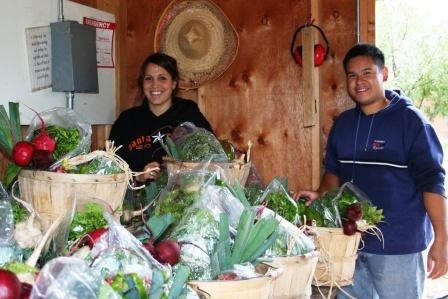Posts Tagged: Mark Van Horn
New college degree: “Sustainable agriculture and food systems”
The University of California, Davis, is launching a new undergraduate major — “Sustainable Agriculture and Food Systems.” The program integrates several subjects to give students an understanding of the many issues facing contemporary farming and food systems, including production, processing, distribution, consumption, and waste management.
As noted in the Los Angeles Times, “With rising public interest in where our food comes from — as well as in "green" living — it makes sense that higher education would be eager to attract students who want to tap into the intersection between these two fields.”
Students will focus on the social, economic, and environmental aspects of agriculture and food — from farm to table and beyond. The program is designed to help students obtain a diversity of knowledge and skills, both in the classroom and through personal experiences on and off campus.
Students will take courses in a broad range of disciplines, but will focus in one of three tracks: Agriculture and Ecology, Food and Society, or Economics and Policy.
“This interdisciplinary curriculum will prepare students to become leaders in agriculture and food systems,” said professor Thomas Tomich, the major adviser for the program and director of the Agricultural Sustainability Institute at UC Davis.
The major is new, but UC Davis has been covering the subject in field- and classroom-based interdisciplinary learning opportunities at the Student Farm at UC Davis for more than 35 years, said Mark Van Horn, the Student Farm director who will teach a core course in the major.
“Learning through doing and reflection adds a valuable dimension to students’ education because it helps them see the connections between theory and practice in the real world,” Van Horn said.
“This is an exciting addition to the college that reflects a change in how we think about food and agriculture,” said Neal Van Alfen, dean of the College of Agricultural and Environmental Sciences. “Students will gain a broad perspective of what it takes to put dinner on the table in an era of greater demand and fewer resources.”
For more information:
- Full press release
- UC Davis Student Farm
- UC Davis Agricultural Sustainability Institute
- About the major
New sustainable ag major is a return to UCD’s roots
A new bachelor’s degree program at UC Davis is meant to gives students an understanding of the social, economic and environmental aspects of farming and food systems, reported Cory Golden in the Davis Enterprise. Some of the lessons taught in the program will harken back to the interdisciplinary courses that have been taught at UCD’s Student Farm for more than three decades.
Effective pest control for indoor citrus nursery production
Cary Blake, Western Farm Press
California and Arizona citrus nursery growers are shifting production of critical plants from the outdoors to ‘indoor protective structures’ to gain protection from the Asian citrus psyllid insect and its primary vectored disease Huanglongbing. The change will require growers to adjust to new pest control techniques. “You’ll likely find extra pests indoors that you haven’t dealt with outside including mites and thrips,” said Jim Bethke, UC Cooperative Extension floriculture farm advisor in San Diego County. “It’s very hard to exclude mites with screening material. The screen can exclude the Asian citrus psyllid, but will not keep out thrips.”

Mark Van Horn, director of the Student Farm, gives a UC Davis class a tour of the farm's market garden.
Organic farming gets more research dollars
The 2008 Farm Bill gave organic agriculture a significant boost by increasing funding for organic research from $2 million a year to $20 million, according to an article in the New York Times.
Reporter Jim Robbins outlined some of the research that is underway across the country, opening with work at the UC Davis student farm, where native sunflowers provide a "bed-and-breakfast" for beneficial insects, according to farm director Mark van Horn.
Robbins also described the work of UC Cooperative Extension farm advisor Rachael Long, who has studied bats' role in battling codling moth in walnut and apple orchards. According to her research, bats eat their weight in bugs every night.
“They eat a ton of insects,” Long was quoted. “They also eat cucumber beetles and stink bugs, which affect tomatoes.”
Scientists are continuing their research to identify a blend of systems that will grow food and support the natural ecosystem on the farm and beyond.
“That’s the holy grail,” Van Horn told the reporter. “An agricultural system that mimics a natural system.”

Bats help organic farmers by feeding on crop pests.

